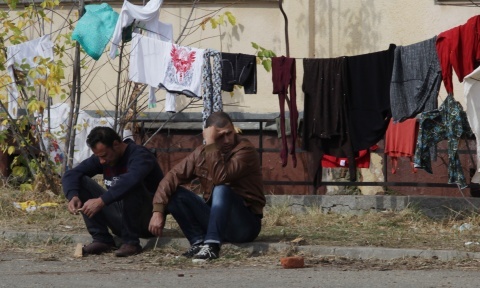
Syrians wait in a refugee camp in the Bulgarian capital of Sofia. Bulgaria has been unable to handle the number of migrants entering its borders, many fleeing the ongoing civil war in Syria. Photo: Sofia Photo Agency
For a large number of refugees fleeing Syria, life in the place they end up is no less a struggle.
Many Syrians looking to escape the ravages of war in their home country have made their way to Bulgaria (via Turkey) — the country I now call home. The problem is that the influx has been much greater than Bulgaria anticipated, and the economically struggling Balkan nation can’t handle the new arrivals.
Bulgaria has received about 10,000 migrants in 2013, about two-thirds of them from Syria and many traveling through illegal channels. This is a seven-fold increase from last year, and currently housing is available for only half of the refugees. Hastily constructed camps suffer from a dearth of medical treatment, food, and basic living standards. In some cases 10 families share a single room.
Despite its financial difficulties, Bulgaria is spending $4 million to construct what it calls a “temporary engineering installation” along a section of its border with Turkey where a majority of refugees are smuggled into the country. In reality it is a 21-mile long, 3-meter tall wire fence. Smugglers have targeted Bulgaria as a destination for migrants after Greece built a similar fence along its Turkish border.
The impact of refugee movements has reached far beyond border areas. Far right and ultranationalist parties have recently been gaining in popularity in the parliament, and ethnic violence is popping up. On Nov. 4, 2013 a Syrian boy was stabbed outside a school in Sofia, Bulgaria’s capital. A mob assaulted two Syrians in Sofia earlier this week. Many migrants fear for their safety.
Most Bulgarians I have spoken with feel strongly that the influx has to stop, and accepting refugees is one of the country’s greatest problems.
Syrians are no more pleased with the situation- one refugee in an overpopulated Bulgarian camp interviewed by The Economist declared, “This is a nightmare, I want to go back to Syria.”
The place refugees end up in should be better than the place they left. But what if the place they end up can’t provide basic medical services or minimally acceptable living conditions?
International organizations, governments- someone has to amend this situation, provide some kind of conduit for Syrian refugees to reach a reasonable new home without putting untenable pressure on the receiving locale. Not an easy task to be sure, but the current situation cannot be upheld much longer. Democracy can’t help if basic living structures can’t or won’t be provided.
One thing for sure, the way things are now no one’s lives seem to be improved.